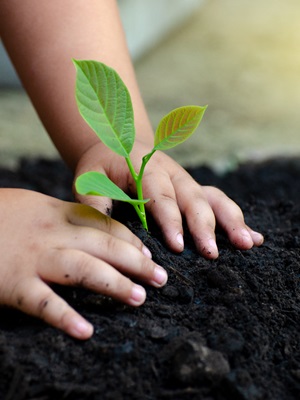Overcoming climate change is a priority for all parties, including the government, industry owners, and every individual. As individuals, our role is crucial. By adopting a sustainable lifestyle guided by the principles of preventing, reusing, recycling, and composting, we can contribute to slowing climate change. A sustainable lifestyle helps us make choices consciously and with minimal impact, thereby reducing the negative impact on ourselves and the environment in the future.
According to data from the National Waste Management Information System of the Indonesian Ministry of Environment and Forestry, in 2023, Indonesia produced 17.9 million tons of waste, 40% of which comes from households, and the most waste is food waste. The continuing increase in population is proportional to the rise in the volume of waste produced. In Indonesia, the primary waste management system is going to landfills. Meanwhile, as much as 5.9 million tons of waste in 2023 will still need to be managed. This fact encourages individuals to manage their waste independently at home because small movements in each house will have a significant impact.
Preventing: preventing waste from entering the house
The first step to implementing a sustainable lifestyle is to prevent waste and overconsumption. As the old saying goes, prevention is better than cure, so preventing waste generation is more important than recycling. Even though recycling sounds fantastic, recycling requires a lot of resources, and the results can differ from before recycling.
Re-thinking before buying is a way to prevent overconsumption. Before buying a product, we need to answer questions to be sure that we are buying because we need it, not just impulsive buying. Some questions we can ask are:
Is there a similar item with the same function that I already have?
Does anyone sell second-hand or rent out?
After buying it, where will I place this item?
After not being used, where will this item go?
As consumers, we certainly have the power of the market because supply comes from demand. Our product choices will signal to the market what we need. For example, if we consistently ask the seller to reduce the plastic packaging or replace it with compostable packaging, they will notice the signal and eventually change their packaging.
Another way to prevent waste in our homes is to avoid using single-use plastic when buying groceries. If we shop at the traditional market, we should always bring our grocery bag and notify the seller that we don't need the veggies packaged one by one in plastic. Bringing our water bottles can also reduce plastic waste because more than 1 million bottles of water are sold worldwide every minute.
Reuse: extending the lifespan of products
Reusing or repurposing our products is another way to live more sustainably. Instead of disposing of our products after they are used once, we can explore creative ways to extend their lifespan. Upcycling, selling on the second-hand market, donating, or swapping goods can be options to consider before disposing of our products.
In an era where we can have transactions from home via e-commerce, we must be more mindful when buying goods and prioritize buying products of good quality so that their longer lifespan can minimize waste and reduce manufacturing resources. By reusing items, we minimize the demand for new products, reducing energy consumption and greenhouse gas emissions associated with manufacturing and transportation.
Recycling: sorting and recycling responsibly
Even though we have prevented waste and reused what we have, humans consume daily, so we will always produce waste; one way we can avoid this waste from ending up in landfills, in the waters, or at sea is by sorting our waste according to its type and handing it over to the waste manager. Many waste banks and managers are currently established in Indonesia, although not all areas are covered. In regions without waste management facilities, residents can donate their segregated waste to scavengers or sell it to scrap dealers.
Choosing products from brands responsible for packaging waste can also be an option. Currently, brands provide services for returning packaging waste for further processing, either for reuse or handing it over to a waste manager. Most importantly, we as consumers must continue to educate ourselves about the impact of our consumption process so that when making transactions, we also consider the effects in the future.
Composting: returning what is from the soil back to the soil
Cooking is one way to reduce carbon emissions in the food supply chain, but organic waste is produced daily from cooking at home. Composting is one way to handle this organic waste, and it should be mandatory for every home to reduce the volume of waste sent to landfills. Composting will convert organic waste into nutritious soil, significantly reducing methane gas production in landfills.
The waste condition, which is usually mixed, causes organic waste not to get enough oxygen, so methane gas is formed during decomposition. Methane gas is among the top three contributors to greenhouse gas emissions today. It can last in the atmosphere for a decade, so preventing the formation of methane gas from the waste we throw away will have a significant impact.
Making and managing a composter is relatively easy daily. Even people with limited land and time can compost using the correct method. Also, there are tons of tutorials on the internet that can guide us in starting our composting journey.
In conclusion, adopting a sustainable lifestyle in our homes is a powerful way to tackle climate change. We can minimize our impact and promote environmental stewardship by implementing the preventing, reusing, recycling, and composting concepts in our daily lives. As individuals, we have the power to make a difference today for a healthier and more sustainable planet in the future. So, the choice is in your hands now.
Literature:
Aulia, D. C., dkk. (2021). Peningkatan Pengetahuan dan Kesadaran Masyarakat tentang Pengelolaan Sampah dengan Pesan Jepapah. Jurnal Pengabdian Masyarakat Kesehatan, 1(1), 62-70. doi.org/10.31849/pengmaskesmas.v1i1/5516
Beattie, G. & McGuire, L. (2016). Consumption and climate change: Why we say one thing but do another in the face of our greatest threat . Semiotica, 2016(213), 493-538. https://doi.org/10.1515/sem-2015-0109
Sistem Informasi Pengelolaan sampah Nasional. (2023). https://sipsn.menlhk.go.id/sipsn/
United Nations Environment Programme. (2009). Waste and Climate Change. https://wedocs.unep.org/bitstream/handle/20.500.11822/8648/Waste&ClimateChange.pdf?sequence=3
World Meteorological Organization. (2023). Greenhouse Gas concentrations hit record high. Again. https://wmo.int/news/media-centre/greenhouse-gas-concentrations-hit-record-high-again
Yuli, Hendra. (2026). Perbandingan Sistem Pengelolaan Sampah di Indonesia dan Korea Selatan: Kajian 5 Aspek Pengelolaan Sampah. Aspirasi: Jurnal Masalah-Masalah Sosial, 7(1), 77-91.
Posted 20/03/2024

















